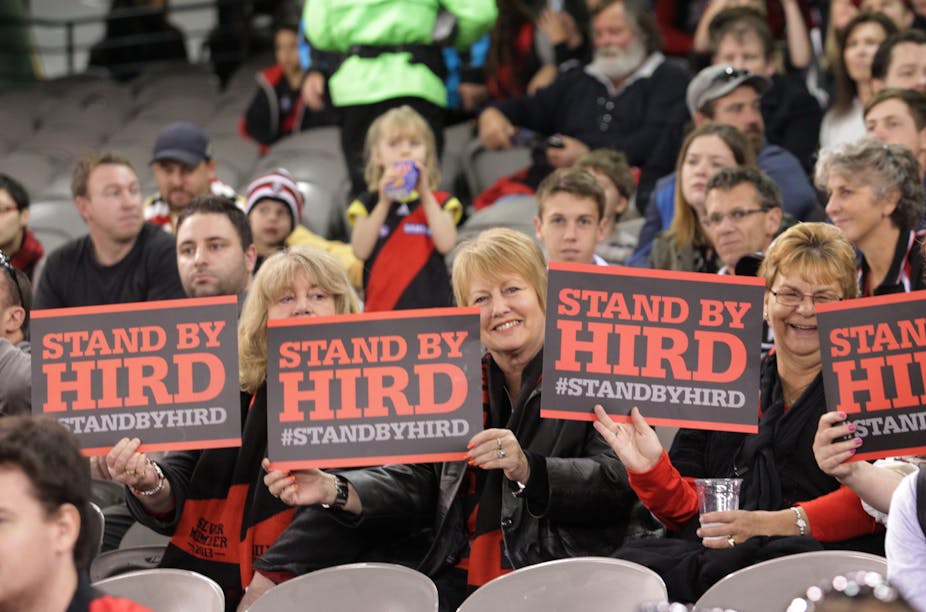When the drugs in Australian sport investigation was announced in early February, much was made of the importance of protecting fans from the actions of wrongdoers. But here we are, three months into this investigation and attendance records are being set, membership sales are strong and public interest in sport seems solid. It raises the question – do sport fans really care?
We haven’t heard much from fans on this topic outside of social media. With so much of the detail still being questioned, this is probably because many sports fans themselves don’t know what to think about it all. Gauging public views on issues like this is always very difficult. Opinions shift quickly, and you often only hear from those with a particular axe to grind.
Late last year, however, we surveyed over 17,000 Australian adults about their sport interests and behaviours. In addition, each year we survey over 70,000 season ticket holders from 25 different teams across four different sports. The data gives some insights into how fans might react.
Around 15% of Australians claim to have little or no interest in sport. So, they wouldn’t care about a scandal? Well, actually, a scandal reinforces the negative attitude these people have towards sport – it justifies their decision not to engage and thus makes conversion of them to fans that much harder for sporting codes in the future.
Among those who do follow sport are two very different groups. At one end of the scale sit those intense fanatics who cannot envision life without their favourite team. Comprising less than 10% of any team’s fanbase, these are the “hardcore” fans that never miss a game, demolish club debts and update merchandise annually.
At the other end sit those who consume sport as circumstances dictate but can go for years without ever attending events. They follow their team through media or friends, and view sport as just one of many entertainment options in their lives. These more casual fans comprise around 50% of any team’s fanbase. Though less engaged, they are still vitally important for the impact they have on TV ratings, sponsorship and word of mouth due to their numbers. Large AFL teams would have more than 250,000 casual fans.
This is common of any brand or product category - heavy users will be massively outweighed by light users. Heavy and light users, however, react very differently to adverse information about their brands.
Hardcore Essendon fans, for example, will be collecting information about the drugs scandal that engulfs their club like a diligent spy. They will read widely and discuss intensely as they look for ways to balance what is being said about their team, with what they have grown to believe over their lives (that is, “Essendon is great”).
These fans are so strongly identified with the club that it is now part of who they are. An attack on the club is an attack on them. But there is one thing hardcore fans consistently tell us would lead them to abandon the club – if the club was hit by a scandal that it failed to respond to properly. So it’s not the mistake, it’s how it is dealt with. Hardcore fans will give the benefit of doubt, they will pay attention to the clubs communications and they will make an informed decision about whether the club still reflects who they are.
Casual fans have their opinions shaped more strongly by others: that is, media, friends and family. They think less about sport and consume it less often, and thus their brand associations are less evolved, less considered. The casual fan might see recent news coverage and assume Australian sport is riddled with drugs. Casual fans consume sport because it is fun and a way of achieving other important goals like going out with the family or making small talk with taxi drivers.
Professional sport risks no longer being seen as a good way of socialising with the family if fans worry about their kids getting too competitive and failing to learn moral values. This is supposed to be fun but it’s hard to feel good watching your team have a win if you are worrying about what they did to get it. Sport under this sort of cloud fails to fulfil its basic function for casual fans, and they simply switch their attention to other sources of entertainment when it all gets too hard.
So yes, fans care about issues like drugs in sport, even those people who don’t really care that much about the sport. When AFL boss Andrew Demetriou talks about the integrity of the game, he knows it’s not just a buzzword. More important than the spectacle, more important than ticket prices or food and beverage is that sport provides people with a fun form of escapism they can be proud to be associated with.
Australia’s sport managers are amongst the best in the world. They will need to be at their best to ensure the fun isn’t knocked out of footy.

